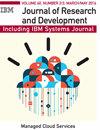An open-source solution to performance portability for Summit and Sierra supercomputers
IF 1.3
4区 计算机科学
Q1 Computer Science
引用次数: 2
Abstract
Programming models that use a higher level of abstraction to express parallelism can target both CPUs and any attached devices, alleviating the maintainability and portability concerns facing today's heterogenous systems. This article describes the design, implementation, and delivery of a compliant OpenMP device offloading implementation for IBM-NVIDIA heterogeneous servers composing the Summit and Sierra supercomputers in the mainline open-source Clang/LLVM compiler and OpenMP runtime projects. From a performance perspective, reconciling the GPU programming model, best suited for massively parallel workloads, with the generality of the OpenMP model was a significant challenge. To achieve both high performance and full portability, we map high-level programming patterns to fine-tuned code generation schemes and customized runtimes that preserve the OpenMP semantics. In the compiler, we implement a low-overhead single-program multiple-data scheme that leverages the GPU native execution model and a fallback scheme to support the generality of OpenMP. Modular design enables the implementation to be extended with new schemes for frequently occurring patterns. Our implementation relies on key optimizations: sharing data among threads, leveraging unified memory, aggressive inlining of runtime calls, memory coalescing, and runtime simplification. We show that for commonly used patterns, performance on the Summit and Sierra GPUs matches that of hand-written native CUDA code.Summit和Sierra超级计算机性能可移植性的开源解决方案
使用更高抽象级别来表示并行性的编程模型可以同时针对CPU和任何连接的设备,从而减轻当今异构系统面临的可维护性和可移植性问题。本文描述了在主流开源Clang/LLVM编译器和OpenMP运行时项目中,针对组成Summit和Sierra超级计算机的IBM-NVIDIA异构服务器的兼容OpenMP设备卸载实现的设计、实现和交付。从性能的角度来看,协调最适合大规模并行工作负载的GPU编程模型与OpenMP模型的通用性是一个重大挑战。为了实现高性能和完全可移植性,我们将高级编程模式映射到经过微调的代码生成方案和自定义的运行时,以保留OpenMP语义。在编译器中,我们实现了一个低开销的单程序多数据方案,该方案利用GPU本机执行模型和回退方案来支持OpenMP的通用性。模块化设计使实现能够扩展到针对频繁出现的模式的新方案。我们的实现依赖于关键的优化:线程之间共享数据、利用统一内存、运行时调用的主动内联、内存合并和运行时简化。我们表明,对于常用的模式,Summit和Sierra GPU的性能与手工编写的本地CUDA代码的性能相匹配。
本文章由计算机程序翻译,如有差异,请以英文原文为准。
求助全文
约1分钟内获得全文
求助全文
来源期刊

IBM Journal of Research and Development
工程技术-计算机:硬件
自引率
0.00%
发文量
0
审稿时长
6-12 weeks
期刊介绍:
The IBM Journal of Research and Development is a peer-reviewed technical journal, published bimonthly, which features the work of authors in the science, technology and engineering of information systems. Papers are written for the worldwide scientific research and development community and knowledgeable professionals.
Submitted papers are welcome from the IBM technical community and from non-IBM authors on topics relevant to the scientific and technical content of the Journal.
 求助内容:
求助内容: 应助结果提醒方式:
应助结果提醒方式:


